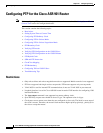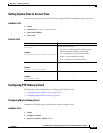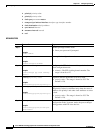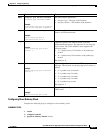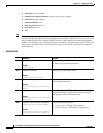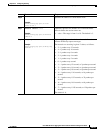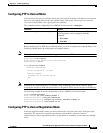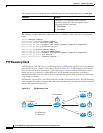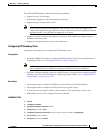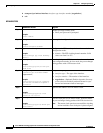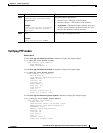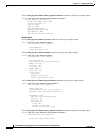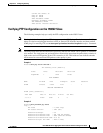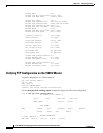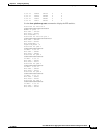
22-26
Cisco ASR 901 Series Aggregation Services Router Software Configuration Guide
OL-23826-09
Chapter 22 Configuring Clocking
Configuring PTP for the Cisco ASR 901 Router
The command used for configuring Cisco ASR 901router on unicast negotiation mode is clock-port.
The following example shows the configuration of Cisco ASR 901 router on the unicast negotiation
mode:
Router# configure terminal
Router(config)# ptp clock ordinary domain 0
Router(config-ptp-clk) clock-port SLAVE slave
Router(config-ptp-port)# transport ipv4 unicast interface loopback 23 negotiation
Router(config-ptp-port)# clock-source 8.8.8.1
Router(config)# ptp clock ordinary domain 0
Router(config-ptp-clk)# clock-port MASTER Master
Router(config-ptp-port)# transport ipv4 unicast interface loopback 23 negotiation
Router(config-ptp-port)# sync interval <>
Router (config-ptp-port)# announce interval <>
PTP Boundary Clock
A PTP boundary clock (BC) acts as a middle hop between a PTP master and PTP slave. It has multiple
ports which can act as a master or slave port as shown in Figure 22-1. A PTP boundary clock has one
slave port and one or more master ports. A slave port acts as a slave to a remote PTP master, while a
master port acts as a master to a remote PTP slave. A PTP boundary clock derives clock from a
master/grand master clock (by acting as a slave) and sends the derived clock to the slaves connected to
it (by acting as a master).
PTP boundary clock starts its own PTP session with a number of downstream slaves. The PTP boundary
clock mitigates the number of network hops and results in packet delay variations in the packet network
between the grand master and slave.
Figure 22-1 PTP Boundary Clock
Command Purpose
Router(config-ptp-clk)# clock-port
Configures Cisco ASR 901 router on unicast
negotiation mode. The following options can be
configured with this command:
• Port Name
• Port Role
303315
PTP Master
PTP Boundary
PTP Slaves
M
M - Master Port
S - Slave Port
SMS
M
S
M
S



